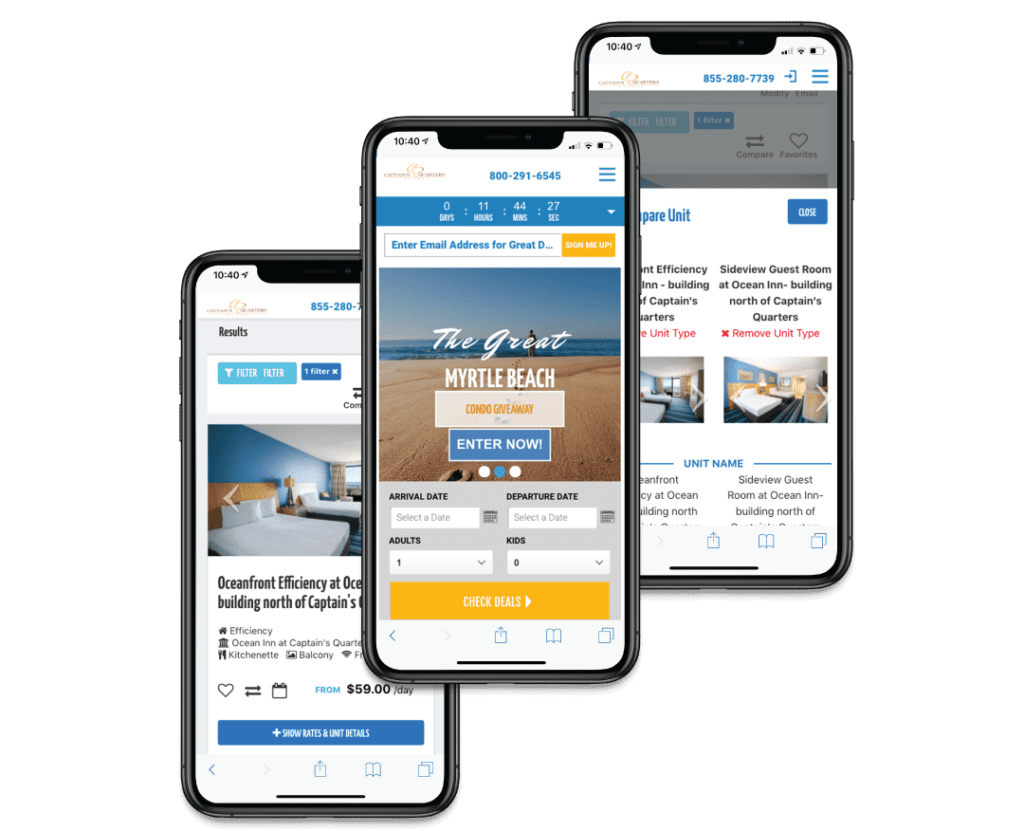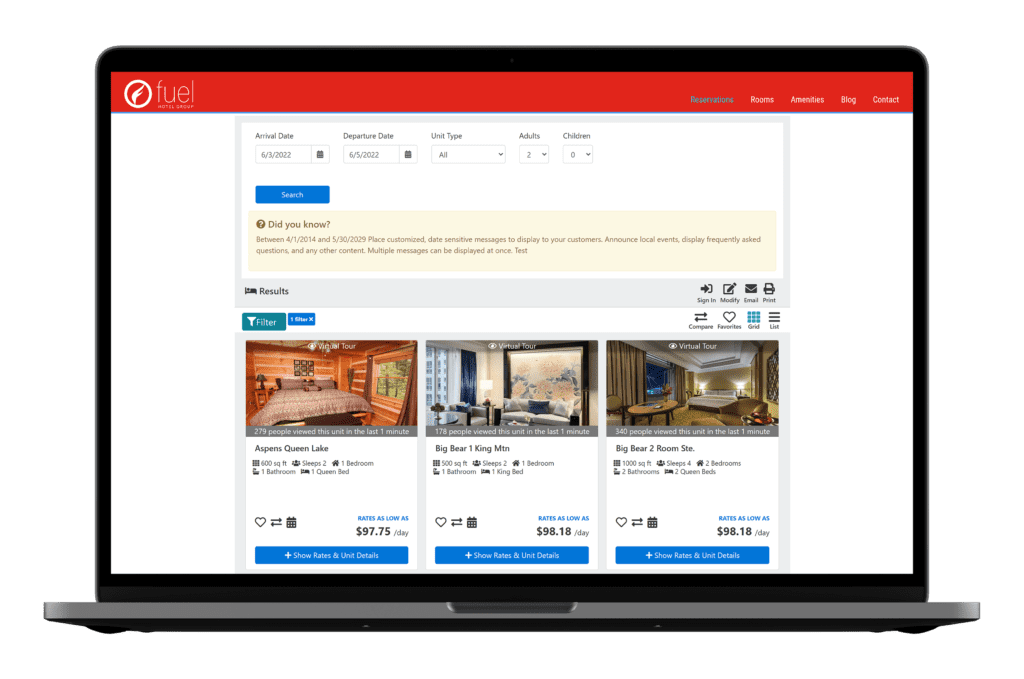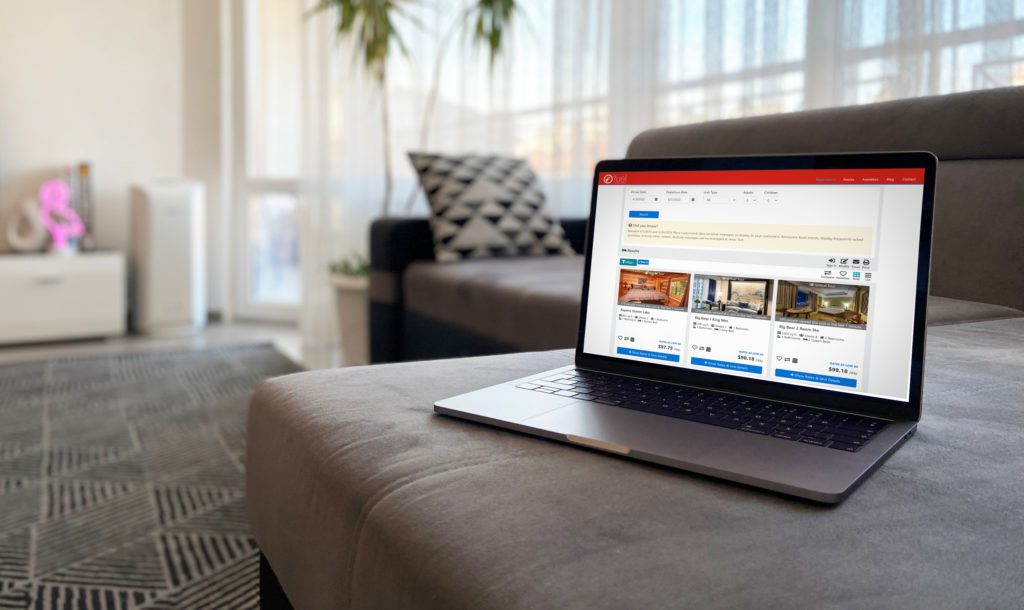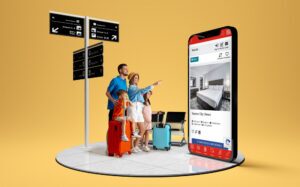An online hotel booking software’s interface, compatibility, integrations, and ease-of-use are elements to look for when upgrading your property’s system. If your hotel is considering ways to increase direct bookings, updating your reservation system can be an excellent tactic, as long as you find a good fit for your hotel. The right hotel booking engine can streamline guests’ interactions, increase user satisfaction, and boost direct revenue, so you should consider it thoughtfully.
While you likely know what hotel booking software is, you may not fully understand how to select a system—but we can help. Let’s explore which elements to consider when selecting hotel room reservation and management software, and identify questions to ask to make this process smoother.
Key Features To Consider in Online Hotel Booking Software
A new booking engine must be compatible with your existing technology, it must feature an attractive interface, and most importantly, it must convince travelers to book. But that’s not all. The high-level list of considerations for hotel reservation software includes:
- A user-friendly interface
- Mobile compatibility
- Integrations
- Real-time availability and pricing
- Secure payment processing
- Customization and flexibility options
- ADA-compliant features
- Customer support and service
Let’s unpack what makes each of these features so important for direct bookings and your property’s operations.
User-Friendly Booking Interface
A user-friendly interface is the cornerstone of a positive booking experience. Your software should feature intuitive navigation, a clear design, and truly straightforward tools to compare options and get from point A (travel shopping) to point B (making a reservation!).
A booking engine with a streamlined interface quickly and effortlessly provides potential guests the information they need to make purchase decisions. User-friendly hotel room reservation software will include these elements clearly, right where guests expect to find them:
- Calls to action and booking prompts
- Room rates
- Room or package comparison tools
- Flexible sorting and filtering options
- Navigational buttons and instructions
Mobile Compatibility
We’re in the smartphone era, and your hotel reservation software needs to follow suit. Smartphones now capture nearly half of all bookings, making mobile compatibility non-negotiable and a hotel mobile app an excellent tool to drive direct bookings.
Hotel booking software must offer a responsive and optimized experience across every device, whether travelers are shopping online or through your hotel’s app. A mobile-first booking engine doesn’t compromise. It should be just as easy to book on a phone as on a computer!

Be sure potential guests can seamlessly make reservations on their smartphones or tablets by looking for a hotel booking engine with these capabilities:
- Responsiveness: The booking engine should adapt to various screen sizes and resolutions.
- Easy navigation: A streamlined booking process should feature appropriately sized text and easy-to-click fields and buttons.
- Supports mobile payments: Allow mobile users to pay how they prefer, with options for credit cards and digital wallets.
- Compatible with mobile tools: Make it easy for guests to add travel plans to their calendars and share their reservations via text or email.
Integration Capabilities
Integrations between your hotel booking management software and other systems or third-party applications are vital features. For real-time updates and seamless data flow, consider cloud-based hotel reservation software to access and manage third-party systems from anywhere with an internet connection.
A reliable integration between your property management systems (PMS) and booking engine reduces manual updates and minimizes errors, enhancing operational efficiency.
When considering which hotel software will be best, think about how other types of PMS integrations can help streamline your hotel operations, including:
- Channel Managers: Provides real-time updates on availability and rates to prevent overbookings and simplify inventory management across all major OTAs.
- Revenue Management Systems: Allows hotels to adjust pricing in real time and maximize revenue using real-time market conditions.
- Customer Relationship Management: Automates customer data entry and collection to enhance personalized interactions and streamline customer management.
- Marketing Automation Tools: Improves the customer experience and the hotel’s lead generation capabilities using automated integrations for confirmations, reengagement, and post-stay surveys.
Real-Time Hotel Room Availability and Pricing
Live updates on room availability and pricing help you avoid double bookings and give accurate information to potential guests. When online hotel booking software is compatible with dynamic pricing integrations, you can enable strategies to adjust pricing and:
- Maximize revenue during peak times
- Attract bookings with promotions during slower periods
- Provide real-time synchronization to reflect changes instantly across all platforms
Secure Payment Processing
Ensuring the security of financial transactions is a top priority for hotels. Don’t compromise on hotel booking management software; it must comply with industry standards for secure payments, safeguarding hotel and guest data. Prioritizing security across the hotel’s alternative payment options and communicating safety features to guests on your booking page increases the likelihood that someone will convert. A secure gateway builds trust with customers, encouraging them to complete bookings without apprehension.

Customization and Flexibility
For hotel reservation software, one size does not fit all. When hoteliers select an engine capable of customized booking processes, like Fuel Travel’s online hotel booking engine software, they can create a better guest experience. Customizing the booking engine’s appearance and offers allows hoteliers to align the entire shopping process with their brand and highlight unique value propositions.
Customizable booking software can enhance a hotel’s direct booking strategies and tailor the shopping experience for travelers through:
Branding
- With a custom booking interface, the look and feel of the booking pages are on-brand, and showcase consistent imagery, fonts, and color themes.
- Carrying the hotel’s voice and personality through the booking engine engages potential guests and highlights unique selling propositions with personalized descriptions.
- Hosting booking software on your website rather than using a new URL provides a seamless experience that’s familiar and trusted.
Promotions
- Create targeted offers, such as stay longer / save more, to motivate guests to extend their reservations.
- Include services or products with the stay that OTAs can’t match to encourage guests to book directly with your hotel.
- Highlight the loyalty program benefits and create fields for guests to sign up and earn exclusive discounts or rewards on a direct booking.
Upsell Opportunities
- Easily create packages to increase revenue and provide guests a curated experience.
- Automate messages to guests about room upgrades and add-ons throughout the booking journey.
ADA Compliance
The Americans with Disabilities Act (ADA) laws ensure individuals with disabilities have access to public spaces. Hotels, including their websites and online booking software, must be ADA-compliant. Like the ADA guidelines for public spaces, the guidance on web accessibility is designed to reduce access barriers. Web Content Accessibility Guidelines (WCAG) also provide recommendations for making websites more accessible. Hoteliers should compare booking engine candidates against website compliance standards to ensure they offer an inclusive experience.
Here are some noteworthy tips for ADA compliance:
- Consider Colors and Contrast: Information may be inaccessible to colorblind users, and screen readers cannot discern color coding, leaving sight-impaired users to miss important details or fields. Poorly contrasting colors can also impede any user’s accessibility.
- Always Use Alt Text: Without text alternatives to images, screen readers cannot convey the images, illustrations, or charts to visually impaired users; this can be detrimental to anyone’s understanding of a room comparison grid or rate chart.
- Add Captions to Videos: People with hearing impairments may not understand information on a video highlighting your hotel’s features, amenities, or rooms without captions; text also gives screen readers valuable details that may be shown rather than explained, that they can relay to users.
- Make Online Forms Accessible: Provide labels for screen readers, clear instructions, and clearly indicate errors in fields to help anyone with a disability navigate room searches or reservation fields without unnecessary difficulty.
- Provide Navigational Options: Sites that allow mouse-only navigation prevent visitors who rely on keyboard strikes or voice from using your hotel’s website; providing a booking engine capable of several navigational options removes these barriers for potential guests.
Customer Support and Service
Responsive customer support from the booking software provider is a lifeline for hoteliers implementing new systems. Whether addressing technical issues or providing training, reliable customer support is a must to ensure a smooth onboarding process and ongoing assistance.
Investigating a new supplier’s practices is as important as analyzing their products or services. Ask the hotel software provider about their level of service and support, using these questions to get started:
- Do you charge for phone support?
- Is it easy to contact a real person who can provide answers quickly and efficiently?
- Can you provide a booking engine product demo?
- Which pricing and subscription models do you recommend for my business?
- Do you provide training for my staff so we can onboard quickly?
- What kind of return on investment should we expect?
- What are the contract terms?
Reliable support ensures that your booking engine is set up properly and maintained whenever updates happen at your hotel.
Choosing Online Hotel Booking Software: 4-Step Process
Now that you know what to look for, you can confidently say what you don’t want. By avoiding hotel booking software that is too limited to scale with your business, isn’t capable of customization, or is a stand-alone program that ignores important integration and channel management features, you’ll be more likely to adopt a system that benefits your guests and your business’s bottom line.
To choose hotel booking software, follow these four steps:
- Assess your property’s requirements, including whether a server or cloud-based hotel reservation software is best
- Review all features of the booking software and compare these against your needs
- Ask intuitive questions of the supplier’s support and services
- Compare pricing and availability
Upgrading Your Hotel’s Booking Software
Bringing your hotel’s reservation solutions into the current century is pivotal for enhancing the guest experience and driving business success. For hoteliers seeking a booking engine that ticks all the boxes, consider the Fuel Booking Engine. This comprehensive product offers user-friendliness, mobile compatibility, integration capabilities, real-time updates, secure payment processing, and customization, plus you’ll receive our unparalleled customer support.
If you have questions about what an improved hotel reservation software can do for your hotel, contact Fuel Travel today to find the right solution for your brand.






